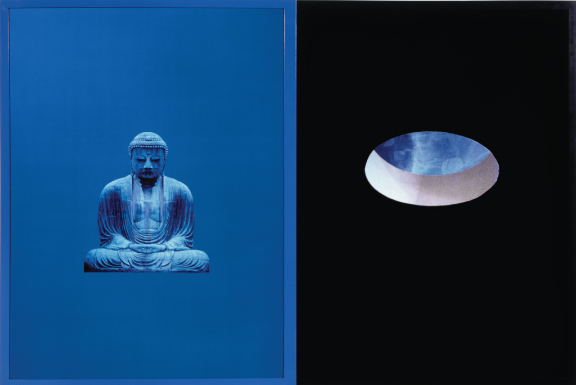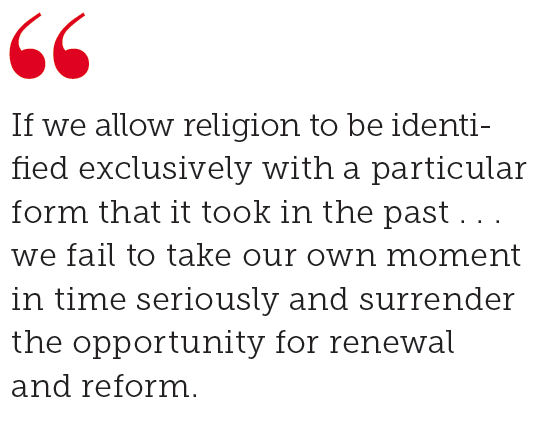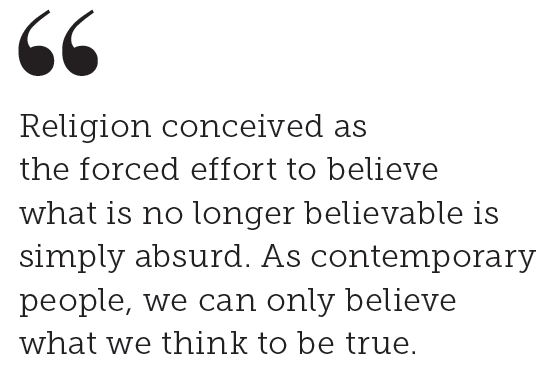My involvement with Buddhism began at the age of 13, when it just showed up at my door. In 1961, my family hosted our town’s one foreign exchange student for the year, and to my good fortune it turned out to be a high school senior from Thailand. I teased her mercilessly for being a Buddhist, and she in turn ridiculed me for being 13. But for some reason she taught me to meditate, and for some reason I took her teachings seriously. Ever since that time I’ve been meditating, studying Buddhist philosophy, and conceiving my life in Buddhist terms.
In spite of that beginning, it has never felt quite right for me to take vows in a particular lineage or enter into a formal relationship with a Buddhist teacher or in some other way formally declare myself a Buddhist. Although I am steeped in Buddhist ideas and practices, I’m also thoroughly American and contemporary in my worldview, which makes it difficult for me to take an existential interest in certain basic Buddhist ideas such as rebirth or parinirvana. Now, because of a knee injury, I can’t even sit in a proper Buddhist meditation posture. Thus all of the obvious, outward signs of being a Buddhist are missing from my life. The problem has been that whenever I’m tempted to do anything that looks traditionally Buddhist I begin to feel like an impostor, someone posing as what he can’t possibly be. Yet even though I don’t look like one, I can’t help but conceive of myself as a Buddhist, a real Buddhist, albeit a contemporary American one. So perhaps the advent of what is now called “secular Buddhism” saves me from identity confusion. Maybe this is my true sangha—at last.
Maybe, but something is missing for me, because if secular means “not religious,” then my sense of impropriety returns. By any definition of religion that interests me, I am a religious person, or at least I aspire to be. I can’t help but think that something important is lost if English-speaking Buddhists make a particular point of identifying with the antireligious orientation of secularity, and because secularity is so thoroughly identified in our culture with antireligion, I don’t know how the connotation can be avoided.
For me, religion is best defined as having to do with the very meaning of human life. Big-picture definitions seem most appropriate—definitions such as Paul Tillich’s image of being grasped by an ultimate concern, an unavoidable concern that connects directly to the essence of life. In that sense, religion is the spiritual dimension of human culture and life, a dimension that will always be present in some way whenever human beings confront what in Zen is called “the great matter of life and death.”
There is a political dimension to culture, an economic dimension, a religious one, and others, and although an individual may not be particularly astute or competent in any one of them, that doesn’t mean that this dimension of human life doesn’t exist. You can be politically agnostic, unengaged, clueless, or incompetent, but that doesn’t mean that politics doesn’t affect your life, or that this dimension isn’t always in play in spite of your disengagement. You can be musically tone deaf and have no understanding of music, just as you can be spiritually “tone deaf” and not understand what people are doing when they engage deeply with matters of ultimate concern. But that deficit is simply an individual’s own lack of awareness, not the absence of this fundamental domain of human life. In this regard, the religious dimension of human culture is no more optional than politics or an economy. That was Tillich’s point, and even if all religious institutions are currently inadequate to dealing with these issues, the human questions themselves don’t go away, just as widespread political corruption doesn’t get us out of politics. Instead of denying or ignoring the religious dimension of life, we should seek to find ways to cultivate and develop it, so that in our time it can be rediscovered and reenvisioned.
Important religious leaders in all traditions are reformers. They cultivate the religious dimension of life by opening up new possibilities for what it might mean to be religious in their time. If we allow religion to be identified exclusively with a particular form that it took in the past, something that will always be inadequate to the present, we fail to take our own moment in time seriously and surrender the opportunity for renewal and reform. We don’t do that in the political realm with democracy, for example. If, from our contemporary point of view, the Greeks or the Enlightenment-era founders of modern democracies didn’t live up to their own principles or mistook which principles were most important, we don’t turn our backs on democracy or claim that politics is dispensable; we just try to show what it would need to look like in our time. Although earlier democratizers couldn’t see what history now allows us to see—the ills of gender inequity, racism, economic injustice, lack of human rights, and more—we are nonetheless in the historical lineage of democracy that moves from their meanings to ours. The fact that our religious inclinations will differ substantially from those of the past doesn’t lift us out of the domain of religion, given an appropriately comprehensive and historically astute understanding of what religion entails.

The Anglo-American tendency to define religion as a belief system is misleading, and quite modern. Belief only comes into play in religion when the shared mythic or narrative basis of culture is broken, when a community’s understanding of what is of unsurpassable importance has been disrupted or thrown into question. Only then do participants notice that they hold such beliefs and begin to investigate them or cling to them. Belief is just the tip of the religious iceberg. When we come to worry about our belief in God or in rebirth, the worldview that supports that belief is already disintegrating, and the movement of history is already ushering in cultural transformation. Religion conceived as the forced effort to believe what is no longer believable is simply absurd. As contemporary people, we can only believe what we think to be true, and some ideas that we have inherited from traditional cultures, like a theistic supreme being or reincarnation, may simply be implausible in our time. For many of us, these ideas are not even serious candidates for belief. At this point in human cultural history, our imaginations turn to other directions when we ponder the basic structures and meaning of our existence.
Authentic religious thinking, traditionally called theology in the West, is a form of second-order critical reflection on religious belief and practice. It aims to propose ideals for thought and practice that inspire full engagement with the most vital questions and concerns in life. Theology is thus a form of contemplative practice. Belief, conceived in a static way, is neither the essence of religion nor the primary focus of a flourishing life, and contemporary Western thinking about religion needs to reorient itself in recognition of that. That reorientation, however, will not be successful if it simply dismisses the role of belief altogether. Although it is not the essence of religion, belief is far from irrelevant in any dimension of human culture. We do, in fact, believe many things to be true, even if in the movement of contemporary philosophy we find it necessary to rethink what it means to say that something is true.
What we think and what we do are interdependent. What we come to believe is shaped by the daily activities that give particular form to our lives, and by the substantial background of culture that develops through all our practices. An important point developed in the Aristotelian lineage of Western thought is that through the force of our practices and habits we develop particular dispositions so attuned to various dimensions of the world that we perceive things in a certain way and therefore hold beliefs of a certain obvious kind. Reciprocally, however, all doing presupposes forms of believing that make these particular practices seem worthwhile. We eat the way we do or raise our children the way we do or practice meditation the way we do because our current beliefs are structured in such a way that this makes sense to us.
The stark dichotomy between believing or thinking and praxis is further undermined when we recognize that one of our most important practices is thinking. The practice of thinking is essential to a mature human life and, when fruitful, leads to beliefs that disclose something important about our own here-and-now acts of existence. I think this is lost on some Buddhists, both Asian and Western, who valorize nonconceptual approaches to meditation while disdaining conceptual contemplative practice.
Two prominent failures are noticeable in this anti-intellectual tendency. First, it fails to grasp that some of the most important forms of Buddhist meditation are conceptual, reflective practices. Second, it fails to see the dangers inherent in unreflective practice. Unreflective practice is as dangerous as unreflective belief—both are examples of unwarranted, unjustified blind faith. Just like beliefs, practices ossify and become dogmatic. We are, however, less susceptible to that danger when we practice critical thinking in a spirit of open engagement. Since their earliest history, Buddhists have placed philosophical, reflective practice under the broader rubric of meditative praxis. Thinking with clarity and vision is one form of meditation that requires cultivation, just like the others. Theory and practice—thoughtfulness and action—will both continue to be the central domains of cultivation for our engagement with the great matter of birth and death.

Secularity—which is to say, our time in history—is the age of science and technology. To the extent that we’re secular, we no longer experience ourselves as being looked upon, overseen by powers out beyond us. Modern subjectivity is secular insofar as we experience our own human agency as supreme—we are the agents of creation and strive toward greater and greater control. Hence Immanuel Kant defined “enlightenment” as maturity: growing up to capitalize on the rational powers in our own hands. The danger that we vaguely sense in this historical development is that our drive to control everything is precisely what we can no longer control. We see the cosmos as being at our disposal, something there for us that we can manipulate toward our own ends and desires. In addition, by aligning itself so closely with science, secular thinking tends to identify truth with the empirical, the calculable, the measureable, and thus the spiritual dimension of human life—questions about the very meaning of human life—begin to seem illusory. Because no other vision of the Good has yet arisen to replace previous concerns such as afterlife in heaven or liberation from the cycle of death and rebirth, consumerism has tended to become our default mode of fulfillment, a kind of global faith in our secular world.
Nietzsche hints in this direction in his famous “death of God” passage in The Gay Science. The madman proclaims the “death of God” and is distraught—he cares deeply and fears the repercussions of this loss. He assumes that with this loss the grounds for higher values have been undermined. The jeering atheists who just laugh at him are thoughtless, smug, and self-satisfied. They are perfectly content not to strive for higher values or for deeper self-awareness or to seek new forms of freedom. Rather than discipline themselves to ponder the meaning of birth and death, these secularists much prefer their current pursuit of poisonous greed, disdainful aversion, and pleasurable delusion. Although Nietzsche’s madman is crazed and disabled by the enormous implications of his insight, the atheists, already dead to any value beyond the most banal forms of self-satisfaction, are worse off.
In the absence of any viable way to assert the existence of God or any other absolute foundation, two paths have opened up. The first is reactionary, a form of nostalgia for the premodern past that manifests in dogmatic attempts to live as though we still reside in some earlier epoch, as though we could still live medieval lives, as though a static human nature can still be taken to sanctify static values. The second path is secularity, which simply accepts our loss of values, rejects the religious past, and tries to make due by focusing elsewhere. Both reactions can’t help but adopt modern ways of thinking about religion. Both theists and atheists assume that faith is a certain kind of belief: certainty about the truth of otherworldly, supernatural propositions. They both proceed as though the question of the existence of God is ultimately an empirical hypothesis about what really exists or doesn’t exist out there, and like all good modernists, both pursue evidence for their convictions about belief and disbelief. While the hopelessness of the theistic effort is obvious, we should recognize that contemporary atheism is equally immersed in an untenable, uninspired vision of who we are as human beings.

In the midst of this standoff between premodern theism and modern atheism, a new and as yet only vaguely formed possibility has emerged: the possibility of post-theistic forms of religious life. While atheism is still caught in a binary opposition with what it must deny, post-theistic religion steps onto new ground. Nietzsche’s “death of God” narrative drops the first post-theistic hint that as we come into our new scientific self-understanding as dependent products of biological and cultural evolution, new forms of enlightened life will emerge. This hint, taken up a half century later by Heidegger, is that the “death of God” might allow for a deeper, richer sense of spiritual life than any found in traditional religions, that this “death” clears the ground for new, revolutionary forms of spirituality that were unimaginable so long as the life-negating, otherworldly structures of theism and afterlife were the primary religious concerns.
That, it seems to me, is our historical assignment, our calling: to affirm the religious dimension of human life by reenvisioning and reformulating spiritual sensibilities at the cutting edge of contemporary thought, practice, and experience. In contrast to the triumphalism and dogmatism that characterize both theism and atheism, a thoroughly post-theistic religious practice would be experimental, moving forward in humility and openness toward a range of new possibilities for enlightened human life.
This post-secular orientation would begin in contemplative practice in order to build habits of mind and body inclined to question the instrumental character of current common sense, which imagines ever new means but never ends, leaving us without ideals and goals suitable to our time. It would cultivate respect for traditional cultural practices through which things in the world mattered in ways other than our instrumental use of them. Post-secular thinkers would be attuned to the imaginative dimensions of earlier religious expressions in text and art, contemplating them not as believers or critical disbelievers but rather as inquirers in search of their own lineage, asking who we are and, given the patterns that have given rise to our identity and situation here and now, who we might become in our unique time.
Post-theistic religious engagement would recognize that the romantic spirituality that gave rise to our interest in Buddhism in the first place—the quest for authenticity, for wholeness, for self-actualization and self-realization—still harbors the hope of escaping from history and the contingencies of finite beings. Instead we might recognize that human beings and human cultures are never complete, not capable of completion because they are finite; that there is no final wholeness, since like evolution itself, there is always more to come. The universe is still experimenting with us and through us, and still sharpening capacities for more comprehensive awareness. Such a historical consciousness will be one of our best cures both for lack of religious imagination and for the barren scholasticism that threatens to engulf academia today. It will help us to realize that human beings have already turned out to be far more malleable than our static conceptions of human nature ever allowed.
The corrupt and maladaptive character of many modern religions and the anti-religious bias of contemporary culture make it tempting to go secular—to refer to the Buddhism of our time as “Secular Buddhism” so that we’re not associated with the anachronistic, supernatural thinking that religion often entails. This is where Secular Buddhism has made a significant contribution, and we are certainly indebted to the bold positions that these Buddhists have articulated. Although Buddhism faces a unique set of challenges in response to contemporary societies, there are serious conflicts with our world that few Buddhist leaders other than Secular Buddhists have been willing or able to face directly, questions of the status of life after death or alignment with developments in the sciences, for example. Secular Buddhists have taken these challenges and in doing that have opened a place for Buddhists like me, for whom the adoption of traditional Asian culture is not possible. Yet in my view, the best parts of Secular Buddhism aren’t really secular insofar as they inspire our contemporary encounter with the great matter of birth and death.
For this reason, I hope that we can take Secular Buddhism beyond the limitations of modern secularity to the more challenging route of reenvisioning the religious dimension of Buddhism for our time. The most important and revolutionary contribution we can make is the joint effort to cultivate a contemporary Buddhist sensibility—one grounded in the long nontheistic tradition of Buddhist thinking and praxis but addressing the kinds of suffering and the possibilities for awakening arising in our time.